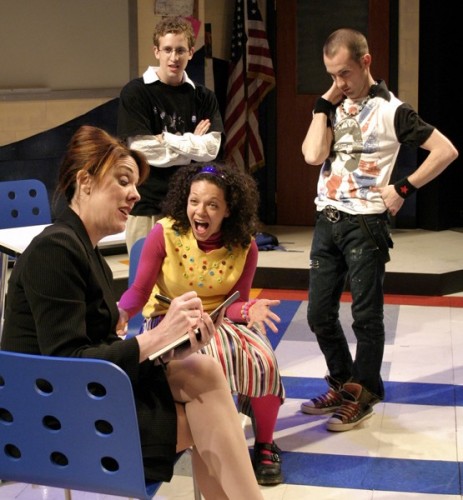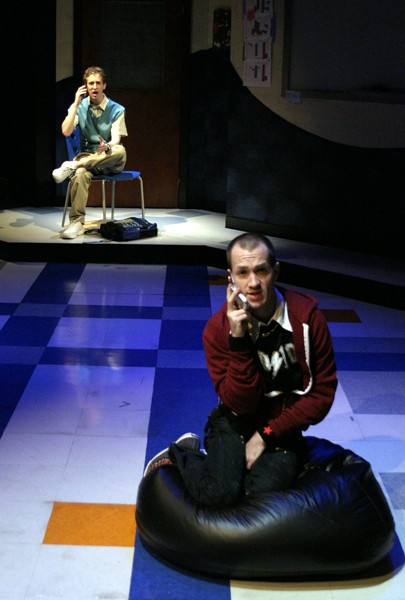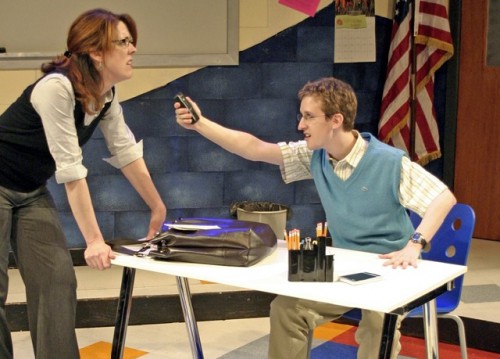Boston Premiere of Speech & Debate at Lyric Stage
Identity, Sexuality and Belonging in the Internet Age
By: Larry Murray - Mar 30, 2009
Speech & Debate by Stephen Karam. Directed by Jeremy Johnson. Scenic Design by Skip Curtiss. Costume Design by Mallory Frers. Lighting design by Margo Caddell. Sound Design by MSteven McIntosh. Production Stage Manger, Dawn Schall. Assistant Stage Manager, Amanda Ostrow. Howie - Chris Conner; Solomon - Alex Syse; Diwata - Rachel Hunt; Teacher/Reporter - Maureen Keiller. At Lyric Stage, 140 Clarendon Street, Boston. 1 hour, 45 minutes. Thru April 25, 2009. Lyric Stage Link
This may be the first play written for twenty-first century attention spans. Rather than the traditional exposition of a plot, this play takes almost a new form, changing the subject every few minutes. It speeds along its roller coaster course with numerous twists and turns in just under two hours with no intermission.The opening night audience had lots of younger people in it and they really liked it. Older viewers found the ride a bit unnerving. Still, the play reflects changes to theatre that are bringing in a new crop of writers and actors who reflect the pared down tastes of an increasingly busy generation.
In the case of Speech & Debate by the promising new writer Stephen Karam, the focus is on high school students who spend much of their lives on cellphones and in internet chat rooms and You Tube. This premise sets us on a rapid fire sprint through rapidly unfolding scenes. Projected computer conversations alternate with face-to-face fragmented scenes, occasionally supplemented by brief song and dance numbers.
At its core, the play's teenagers want others to understand and accept their concerns. But even their peers only hear them out in order to find ways they can advance their own agendas. If the adults in this play don't give the kids a fair hearing, well, neither do their peers. On top of that, they all have their own secret demons. From such tragic mismatched lives a great deal of comedy is mined.
In its own jumpy, multi-tasking and disorganized way, it produces an evening of deep belly laughs and surprises while showcasing the talents of two very promising young actors, Chris Connor (Howie) and Alex Wyse (Solomon). It gives the manic Rachel Hart permission to chew up the scenery as Diwata as she records her podcasts and rehearses her speeches with franetic energy. The audience ate up everything she had to dish out. In fact, her thousand volt performance gave everyone a jolt and helped earn the entire cast a standing ovation at the end. The only adult among these teens was Maureen Keiller who ably doubled as both an insensitive teacher and a self-serving reporter.
Drawing a theatrical picture of adolescent zeitgeist is always risky. The relentless morphing of what constitutes high school life from one generation to the next is daunting, even for the teenagers involved. Speech & Debate was written in 2006 by Stephen Karam and is loosely based on a 2004 sex scandal in Spokane, Washington, in which a supposedly straight mayor was found to be trolling an online gay chat room with an 18 year old male. A witch hunt ensued, and become the basis for many elements of the current play's plot.
The most interesting teen in this bizarre theatrical experience is Diwata. She is portrayed as a talentless actress whose lack of judgement puts Wicked on the same level as Arthur MIller. She will do almost anything to find two more members for her Speech and Debate club so she will be allowed to strut her stuff at competitions. She recruits Solomon, a nerdy, ex-gay kid who is a gung-ho reporter for the school paper and hot on the trail of that mayor, a conservative Republican. The gay teen Howie completes the trio.
But wait, there's more. All three have hidden fantasies which plunge the proceedings into some pretty strange territory. There is the unseen drama teacher, Mr, Healy who has rejected Diwata for a high school production of Once Upon a Mattress. She has sworn revenge. Turns out he has been in a chat room with one of the boys. Diwata also has a thing about the Salem Witch Trials, which is why the play is set in Salem. She has an online blog, which Howie has read in the course of his research into the Mayor. When he quotes her own words, Diwata yells at him: "You read my blog, that's my private journal!"
As the play evolves we find the three preparing to perform a musical featuring an accused witch from The Crucible, who is time traveling to met a teen-aged Abe Lincoln who just happens to be gay. They do a dance number where she asks Abe: "Boy, whatcha doin?" The plot is totally original, is never clichéd or predictable, but is hardly believable either.
Director Jeremy Johnson tends to move the actors around like pawns on a chessboard, in a "triangular circle" to quote one of the play's lines. When hunkered down on-line with their individual computers, the lighting dimmed, the actors seem to disappear into the glow of the computer screen. When off line, the acting was far more energetic and the characters seemed to come to life.
The choreography by Ilyse Robbins pushed the actors to the edge of their limits, energized the proceedings and truly infused the theatre with good-natured fun. The dances were quite a contrast to the bland screen projections of the computer exchanges. The dances were bright and lively while the projected words were hard to discern from the last row of the theatre. Perhaps a better way to have handled the computer exchanges would have been to have used a head shot of the chatter with a voice-over, and the text appearing as subtitles below. This might have served to clarify the interchange, and reinforced the actor's linkage to the disembodied teens.
Because of the constantly changing focus of the dialog and the bizarre side trips into song and dance - as much fun as they were - it was difficult to develop any real feelings toward the characters as one might in a traditional play. The playwright did not allow the actors on stage to fully develop their characters, so they remained incomplete, just as they would be on line.
Speech & Debate does its best to portray the role of the internet in the social life of teens. But change is accelerating. In the brief time that has elapsed since the play was written, the social networking scene has changed radically. Soon, this topical play will be showing its age, just as it gains a foothold in high school productions across the country. In the play it is the chat rooms and podcasts of You Tube that serve as the social networking tools. Today these are being supplanted by FaceBook and Twitter. Writing plays using the internet as a central focus guarantees their planned obsolescence.
Despite this, the play is still relevant, and probably too advanced for many older audience members who still find all the technology discussed on stage to be a bit of a mystery. Speech & Debate also serves as a continuing warning to be wary of predators on the internet.
But if one were to take the play literally, that means that the much talked about online threats are exaggerated and that the real threat still exists right on the school premises, lurking under less than attentive and watchful eyes.
Quick Link to Lyric Stage





